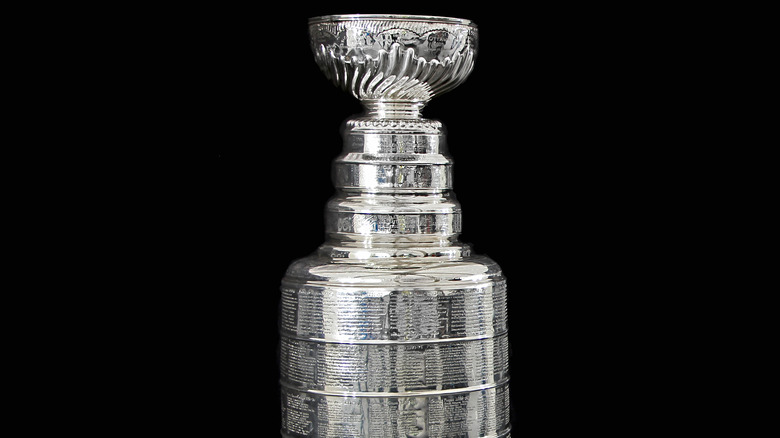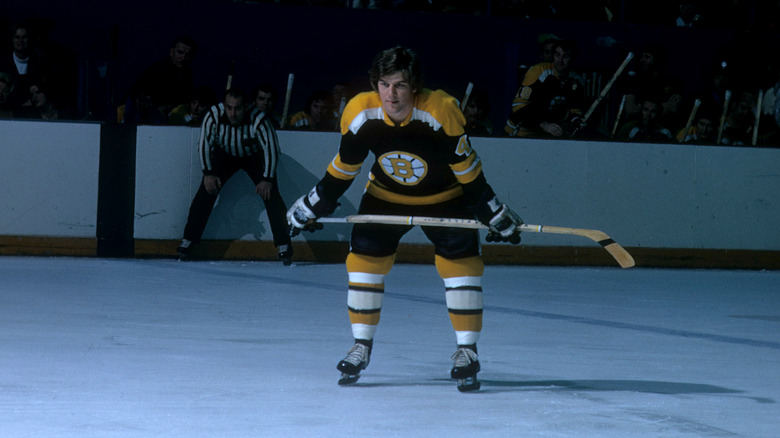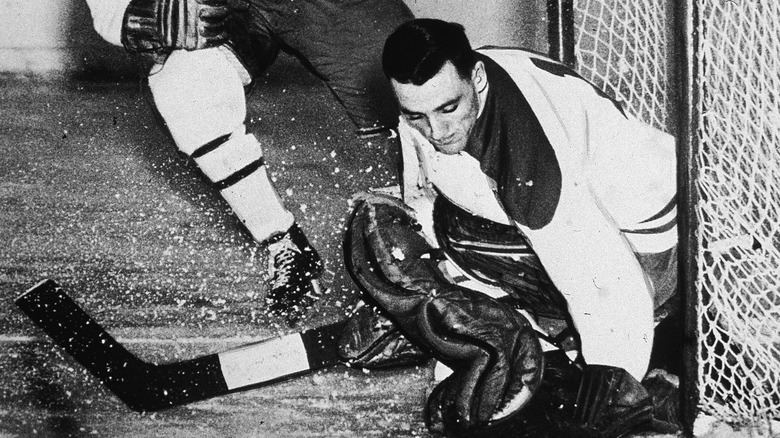There's A Glaring Spelling Mistake On The 1972 Stanley Cup
The Stanley Cup might very well be the most famous trophy in sports. Sure, the World Cup is the most valuable, monetarily speaking, according to Canterbury. The Stanley Cup is quite a way down the list behind the Indianapolis 500's Borg-Warner Trophy and the Preakness Stakes' Woodlawn Vase. But the Stanley Cup's history, and the way it's treated like a celebrity in its own right, add to its prestige.
The Stanley Cup was introduced in the late 19th century by — who else? — Lord Stanley of Preston, who at the time was the Governor General of Canada. His intent was for the Cup to be awarded to the best hockey team in Canada, but over time, it became the de facto trophy of the National Hockey League. Eventually, the NHL reached a deal with the Stanley Cup's trustees in 1947 that gave the league exclusivity to the Cup; however, the league does not own the trophy itself (via Hull & Hull LLP).
Despite its status as an icon, the Stanley Cup hasn't always been treated with the most care. In 2021, the Cup was dented during the Tampa Bay Lightning's championship parade, per CBS. Decades ago, the New York Rangers once held a combination championship/final mortgage payment celebration and nearly torched the Cup. However, it's not just the teams who win it that aren't always careful with the Stanley Cup. Sometimes those engraving team and player names on the Cup's rings should use a little more care.
The 1971-72 Bruins misspelling
One of the things about the Stanley Cup that makes it unique in the sports world is that each team is honored on the trophy itself. Each winning team's players and coaching staff have their names engraved on one of the Cup's rings. Unfortunately, there's no guarantee that those engravings will be error-free.
Sure, some hockey players have names that are somewhat difficult to spell, and even some cities can present a bit of a challenge too. Seriously, whoever handled engraving the Pittsburgh Penguins' victories probably had to check and double-check that there really is an "h" at the end of their city's name. Boston isn't one of those cities. Six letters, two of them are Os and the rest leave little room for interpretation. However, according to the NHL, it was still misspelled.
It happened after the Boston Bruins won the Stanley Cup for the 1971-72 season. That roster included a laundry list of big names including Bobby Orr, Phil Esposito, Derek Sanderson, Reggie Leach, Ace Bailey, and Gerry Cheevers between the pipes, per Hockey Reference While all the player's names were spelled correctly, the Bruin's home city was spelled "BQSTON." Sure, maybe a Q is just an O with a little tail, but that tail makes a big difference.
There have been quite a few other mistakes on the Stanley Cup
The Bruins aren't the only team to fall victim to a typo. According to the NHL, there are 11 other mistakes on the Cup, dating back to the 1941-42 season, when Toronto Maple Leafs goalie Turk Broda's name was listed twice. A few years later, when the Leafs won the Cup during the 1946-47 season, forward Gaye Stewart's name was erroneously written as "GAVE STEWART." The Leafs were on the receiving end of an error in 1963, when their name was misspelled as "TORONTO MAPLE LEAES." In addition to the Boston Bruins and Toronto Maple Leafs, the New York Islanders had their name written incorrectly for their second of four straight Cups, from 1979 to 1983 (via Hockey Reference). The 1980-81 Islanders are listed as the "NEW YORK ILANDERS."
Numerous other players have had their names misspelled, including Hall of Fame goaltender Jacques Plante, who won the Stanley Cup with the Montreal Canadiens in five straight seasons, from 1956 to 1960. Each time Plante hoisted the Cup his name was spelled differently, according to the Hockey Hall of Fame. The most recent spelling gaffe was when goalie Manny Legace of the 2001-02 Detroit Red Wings had his name written as "MANNY LAGASE."
Some names have been removed, including that of Basil Pocklington. He was the father of Edmonton Oilers owner Peter Pocklington, who requested that he be included. However, he had nothing to do with the team, so when the NHL found out about this, they had his name removed by stamping a series of 16 Xs over top of it.


